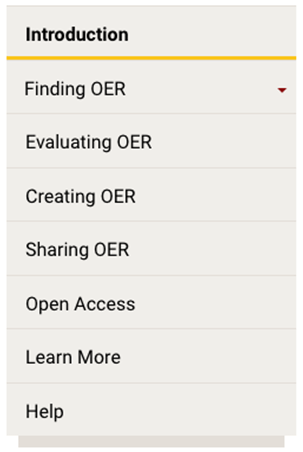Find OER
We'll guide you to the resources to find, adapt, or create OER.

Steps to Finding OER
- Before you go hunting, think about what you're hunting for - image, text, audio, video, etc.
- Think about how much time you have to devote to this OER process.
- Will you create new, adapt what someone else created, or just look for something small and manageable until you're more comfortable with the process?
- Once you begin your hunt, use broad search terms to start, then narrow down after you look at sources your search returns.
- Explore the SU OER Library Guides to search common repositories, or to search by your discipline.
- You can reach out to the OER Librarian if you need assistance finding, adapting, licensing, or hosting your OER.
When you click to explore the SU OER Library Guides, take your time to click on each of the tabs in the navigation menu on the left side.
-
Introduction will give you a basic primer on what Open Educational Resources (OER) are, linked pathways to guide you based on your familiarity with OER, and a video tutorial.

- Finding OER will give you information on how to successfully search for key terms to find the materials you’re interested in, links to OER repositories and also the option to jump directly to:
- Evaluating OER will provide you with links to rubrics to evaluate the various OER you find, to make sure they are quality materials. This page also provides you with additional evaluation criteria, and a tutorial video.
- Creating OER will introduce you authoring tools for any OER you create, and introduce you to communities of experienced faculty. It will also introduce you to licensing on the Creative Commons.
- Sharing OER will introduce you to some of the repositories where you can host and share your OER with others. Salisbury University has their own OER Hub on the M.O.S.T. Commons.
- Open Access will introduce you to other types of educational materials that don’t cost money but do not have the same flexibility of use like OERs do. These can be journal articles openly available on a publisher’s website, or final copies of manuscripts available on a university website or repository, among others. There’s a great diagram on this page to visually understand open access. You will also find an Open Access by Discipline link to help you narrow your search (link pending).
- Learn More will open your eyes globally to everything OER. You will find articles on OER from the experts in the field, faculty like you, who happened to be at the forefront of the movement decades ago, and care share their experiences with you. You will also find links to journals and organizations that are all about OER, as well as current news about OER.
- Help will be there for you if you get overwhelmed or don’t know where to start. On the Help page you will find links to both the OER librarian and the OER instructional designer. We’ve got you covered no matter what type of assistance you need.
